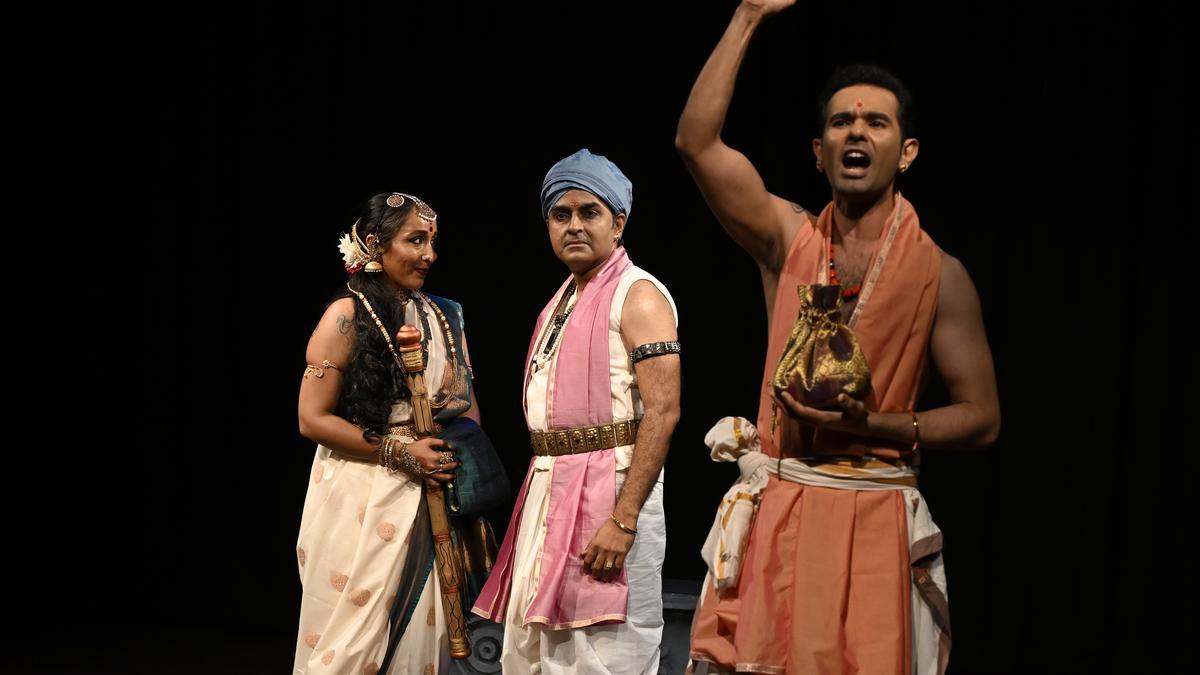
Shraddha’s latest theatrical offering, “Kongai Thee,” penned by the esteemed writer Indira Parthasarathy, skillfully illustrates the contemporary relevance of the ancient Tamil epic, Silappadhikaram. With a script that captivates through its powerful dialogues, the play succeeded in striking a profound chord with its audience.
The narrative of “Kongai Thee” begins with the character Kovalan (portrayed by Swaminathan) returning home after a considerable period of absence. His reappearance sets the stage for engaging interactions, starting with his flattering remarks towards his wife, Kannagi. Kovalan tells Kannagi that it is erroneous for a woman to be beautiful without being conscious of it, a sentiment that later sparks jealousy when echoed to him by Madhavi. This initial scene introduces the complex dynamics of the characters involved.
Madhavi’s character highlights the contradictory standards imposed by society. She points out that Cauvery, a personification of the river, does not reject the Chola king because he has conquered the Ganges. This analogy effectively underscores the double standards prevalent in societal norms—the dharma that permits a man to seek solace in another woman’s arms and yet return to his wife as if nothing has happened. The play uses Madhavi’s dance as a metaphor; while her dance is priceless, she herself, unfortunately, has a price, reflecting the objectification faced by women.
Kannagi and Madhavi’s characters embody the suffering inflicted upon women by a restrictive social system rather than by mere fate. Kovalan’s accusation that Madhavi is incapable of genuine love due to her status as a courtesan is met with an astute retort. Madhavi articulates that women in her position exist so that men can appreciate their wives’ virtue. This critical exchange brings to light the inherent misogyny and the plight of women constrained by their societal roles.
Kavitha Shivakumar’s portrayal of Kannagi is nothing short of remarkable. Her performance transitions from a timid and unquestioning wife to a fierce and avenging woman, demonstrating the character’s depth and the scope for action the role provided.
. In contrast, Preethi’s depiction of Madhavi presented an even greater challenge. Through her mischievous smiles, sarcastic jibes, and quiet suffering, Preethi effectively captured the complexity and nuance of Madhavi’s character, making a lasting impact on the audience.
The exchanges between the narrators, Maadalan (played by Sabarish) and Devandhi (played by Janani), imbued the performance with a lively and engaging energy. Their interaction provided a narrative framework that enriched the storyline and kept the audience invested in the unfolding drama.
One of the standout elements of “Kongai Thee” is its music. Janani’s musical arrangements were instrumental in conveying the emotions of the verses. The selection of ragas such as Amritavarshini, Desh, Hamirkalyani, and Vaasanti, particularly in the Indira Vizha scene, beautifully captured the mood of the play. Preethi’s choreography was equally commendable, as it encapsulated the essence of the verses through well-coordinated dance moves.
The incorporation of traditional percussion instruments like the mizhavu and thudumbu, played by Sashidhar and Ashwin, added a layer of authenticity to the performance. Janani, who also lent her voice to the songs, used a yazh as a drone, further enhancing the musical experience. The use of these ancient instruments, sourced from the URU band, brought a genuine touch of historical and cultural authenticity to the play’s music.
Director Krishnamurthy’s vision for “Kongai Thee” was brought to life with precision and finesse. His adept direction ensured that the complex narrative was communicated effectively, engaging the audience from start to finish. The interplay of dialogues, music, and choreography came together seamlessly to highlight the contemporary relevance of Silappadhikaram, making “Kongai Thee” a powerful retelling of the ancient epic.
In summary, Shraddha’s “Kongai Thee” is a remarkable theatrical production that bridges the past and present through its exploration of timeless themes of love, jealousy, and societal norms. The play not only brings to life the epic love triangle of Silappadhikaram but also invites the audience to reflect on the current social dynamics, making it a thought-provoking and resonant piece of art.












